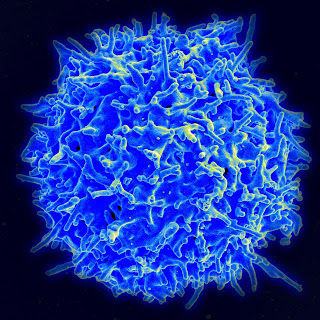Cancer: Could New T-Cell Research Develop A Cure?
 |
| By NIAID/NIH |
T-cells are white blood cells that attack and destroy cells infected by viruses, and even some cancer cells. However, many types of cancer mutate and develop protection against these cells, making it very difficult for the body to fight tumorous growths.
Widget not in any sidebars
Enter Immunocore. This small company based in Oxfordshire has spent the last 20 years focusing their research on enhancing T-Cells to combat this these types of cancerous tumors. Watch in the video below as a T-cell attacks and absorbs a cancer cell.
The premise is this. While the body’s natural immune system usually does a fantastic job recognizing and neutralizing outside threats, antibodies are not usually formed with a genetic predisposition to recognize cells. When cancer cells form, with their structure ‘disguised’ they are almost invisible to the killer cells. The body recognizes that there is a threat, which activates the immune system and triggers the high white blood cell counts that so often lead to cancer testing. But the killer T-Cells are unable to remove the cancer from the body.
What Dr. Brent Jakobsen, chief scientific officer at immunocore, and his team are developing are small protein molecules that act as a glue, attaching solely to cancer cells. The other end of the protein is designed to attach to the protruding ‘receptor’ proteins located on the exterior of the T-Cells. They are basically designing a target for the T-Cells receptor to attach to. Think of a soldier using a laser to mark a target for an air-strike. The ImmTACs, as Immunocore calls them, are the matchmakers forcing the introduction of the T-Cells to the cancerous invaders.
The ImmTACs have been designed to recognize the difference between cancer cells, and the normal, healthy cells that make up our organs and tissues. On the surface of every cell are small proteins known as peptides, which Dr. Jakobsen explained this way:
All these little peptides tell you the story of the cell. The forest of them on the cell surface is a sort of display saying ‘I am this kind of cell. This is my identity and this is everything going on inside me’.
 Immunocore is building a database of cancer cells’ ‘peptide signature’ to enhance the efficiency of their treatment, and also protect healthy cells, thereby limiting side effects and potential harm.
Immunocore is building a database of cancer cells’ ‘peptide signature’ to enhance the efficiency of their treatment, and also protect healthy cells, thereby limiting side effects and potential harm.
The treatment would not be without risk. T-Cells are some of the most powerful operators in our body’s universe, but their potency is what makes them attractive as a possible cure.
You can never make a single-mechanism drug that would come anywhere near a T-cell in terms of its potency.
If you want to make an impact on cancer you need something that is incredibly potent – but when something goes wrong, it goes badly wrong. I think the honest truth about all cancer treatments is that no matter how much we test and do beforehand, it will continue to go wrong sometimes. – Dr. Jakobsen
Widget not in any sidebars
All the pharma companies have come to the realization that immunotherapy may hold the ultimate key to cancer; it is the missing link in cancer treatment that can give cures.
And as with any other profitable resource, when large companies take note, wish it a fond farewell. In this instance, I hope they prove us wrong.
Jonathan Parker is an EMT-Paramedic and Preparedness Instructor with a love for emergency medicine, self-sufficiency and homesteading. His goal is to empower people towards a natural and sustainable lifestyle.




